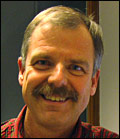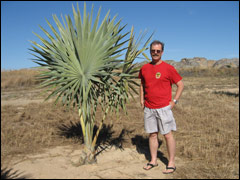
Ron Steenblik.
What work do you do?
I am the director of research for the Global Subsidies Initiative, an ambitious new project under the auspices of the International Institute for Sustainable Development.
What does your organization do?
The GSI was created to measure, analyze, and illuminate subsidies that are undermining sustainability, through targeted research and communications. We are also trying to improve the amount and quality of information on subsidies that are reported to the World Trade Organization, and generally to support subsidy reform.
What are you working on at the moment?

Don’t try to grease this palm.
In October we launched both our dedicated website and our first in-depth study of government support for biofuels. The U.S. study will be followed by reports on Australia, Brazil, Canada, the E.U., and Switzerland. We shall be turning our attention to irrigation and, we hope, energy subsidies in 2007. We are also working on a new suggested template for informing the WTO about subsidies. On the communications side, we are organizing a series of regional workshops to help train journalists, especially in developing countries, to better understand and report on subsidies and their effects.
How do you get to work?
Mostly I telecommute, but sometimes I work at the GSI’s offices in Geneva, Switzerland, which I travel to by high-speed electric train. At the train station I rent a bicycle.
What long and winding road led you to your current position?
My socially liberal, fiscally conservative parents instilled in me an early interest in public policy. Working for a municipal power company in Florida opened my eyes to government waste and inefficiency; a stint at the U.S. Energy Information Administration enabled me to better understand the self-serving arguments used by industries to justify subsidies on their behalf.
My 18 years of employ at the Organization for Economic Cooperation and Development gave me practical experience in measuring and evaluating subsidies, exposed me to countries (such as those of our core funders) that have strong traditions of transparency and accountability in relation to government expenditure, and allowed me to develop a wide network of contacts among individuals and organizations laboring for subsidy reform.
Where were you born? Where do you live now?
I was born in Bangor, Maine, and lived there until my parents — tired of the snow and underfunded schools — hauled us all down to sunny Florida. I graduated from college in upstate New York, worked in north Florida for a few years, and pursued a graduate degree in Philadelphia. That was followed by two years in Washington, D.C. In 1982 I received a Rotary Foundation scholarship, which brought me to Rotterdam, Netherlands. I’ve lived in Paris, France, since 1987.
What has been the worst moment in your professional life?
Trying to obtain visas for several African and Asian experts I had invited to a workshop I helped organize in a Central American country last year comes close to a worst moment. The authorities issued the visas only a couple of days before the people were due to depart; it was a nail-crunching experience.
What’s been the best?
Besides working for the GSI, in general I’ve enjoyed producing information that has helped inform international debates. After I managed (with a colleague) to publish a new data series on government support to fishing, the World Trade Organization included a mandate to negotiate new disciplines on subsidies that encourage overfishing in its latest trade round. I’m not suggesting one led to the other, but generally multilateral negotiations on subsidies are not possible if the data aren’t there.
What environmental offense has infuriated you the most?
The extension of the “dual-fuel loophole” for flex-fuel vehicles (vehicles capable of running on ethanol-gasoline blends containing up to 85 percent ethanol), and the subsidies now being provided to enable drivers of the resulting gas-guzzlers to actually buy E85. Many people have accepted government and industry assurances that buying FFVs is good for America. Yet three-quarters of the latest-year models have 5.3-liter engines. Keeping a typical 2007-model FFV running on E85 costs taxpayers over $500 a year … per vehicle!
Who is your environmental hero?
Theodore Roosevelt was an early inspiration, followed by Rachel Carson and Jacques Cousteau. Today I greatly admire those individuals who are passionate about protecting the environment but unafraid to grill some sacred cows when necessary. I won’t embarrass them by naming them, but they know who they are.
What’s your environmental vice?
I suppose, like many people, it’s traveling by airplane. The IISD does buy CO2 offsets for my business travel, however.
How do you spend your free time? Read any good books lately?
I’m trying to restore a house in the country, while keeping the vines and hedges from running riot. As for books, I just finished Robert Harris’s novel Pompeii, and am reading Greg LeRoy’s The Great American Jobs Scam: Corporate Tax Dodging and the Myth of Job Creation. Come to think of it, both books concern societies on the verge of calamity — one physical, the other fiscal.
What’s your favorite meal?
Almost any meal eaten within earshot of the sea, especially sliced tomatoes, followed by a heaping dish of spaghetti with clams.
Which stereotype about environmentalists most fits you?
I’m a fan of bicycles, I like to wear sweaters, I hate litter, and I have facial hair. And I used to be an avid ultimate-Frisbee player.
What’s your favorite place or ecosystem?
Since I lived for 10 years near the Everglades when it was still a vast wilderness, I have a special fondness for that place.
If you could institute by fiat one environmental reform, what would it be?
Fiats are for dictators, but I would like to see bicycle paths become as ubiquitous as sidewalks, and built into every town’s urban plan.
Who was your favorite musical artist when you were 18? How about now?
Led Zeppelin, which I still like. But nowadays, besides jazz (e.g., Diana Krall) and classical music, I listen to the Dave Matthews Band and Radiohead.
What’s your favorite movie?
Groundhog Day. But this interview reminds me of the questions asked by the bridge-keeper in Monty Python and the Holy Grail (“What is your quest?”), also a personal favorite.
Which actor would play you in the story of your life?
Definitely a comic actor, like John Cleese.
If you could have every InterActivist reader do one thing, what would it be?
Read up on the corrosive effects that corporate welfare is having on the democratic process, and start asking some hard questions about the subsidies and tax breaks their elected officials are doling out to corporations. And then get on yer bike!

